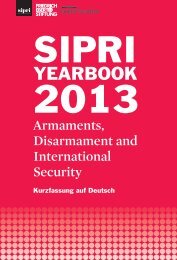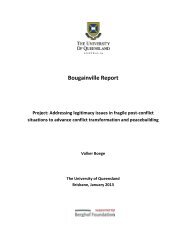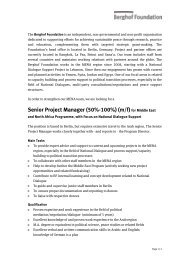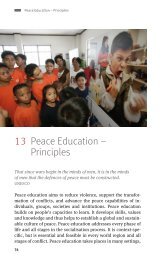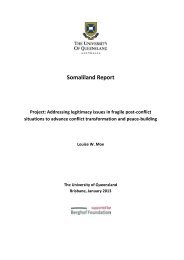Peace and Conflict Transformation Research - Berghof Foundation
Peace and Conflict Transformation Research - Berghof Foundation
Peace and Conflict Transformation Research - Berghof Foundation
Create successful ePaper yourself
Turn your PDF publications into a flip-book with our unique Google optimized e-Paper software.
<strong>Peace</strong> <strong>and</strong> <strong>Conflict</strong> <strong>Transformation</strong> <strong>Research</strong><br />
11 <strong>Peace</strong> <strong>and</strong> <strong>Conflict</strong><br />
<strong>Transformation</strong> <strong>Research</strong><br />
<strong>Research</strong> that produces nothing but books will not suffice.<br />
Kurt Lewin<br />
As a social phenomenon, → conflicts are inevitable components<br />
of human development <strong>and</strong> social change. Violence in conflict,<br />
however, is not inevitable – <strong>and</strong> conflict transformation research<br />
seeks to explore conditions, strategies <strong>and</strong> policies for<br />
sustaining patterns of non-violent behaviour amongst conflicting<br />
parties, particularly in protracted social <strong>and</strong> ethnopolitical<br />
conflict. It aims to support conflict parties in building, restoring<br />
<strong>and</strong> maintaining constructive, just relations in order to abolish<br />
the use of force as a means of interaction in conflict. In this context,<br />
conflicts <strong>and</strong> their h<strong>and</strong>ling should not be looked upon as<br />
65
<strong>Peace</strong> <strong>and</strong> <strong>Conflict</strong> <strong>Transformation</strong> <strong>Research</strong><br />
simplistic linear phenomena that start, escalate <strong>and</strong> stop for all<br />
actors <strong>and</strong> all sectors in the same way. They need to be comprehended<br />
in their interdependent <strong>and</strong> systemic dimensions <strong>and</strong> in<br />
their dynamic nature.<br />
<strong>Research</strong> <strong>and</strong> practice informing each other<br />
<strong>Conflict</strong> transformation research does not encompass a gr<strong>and</strong><br />
theory, but generates theory elements from field research <strong>and</strong><br />
from close interaction with practitioners <strong>and</strong> the conflicting parties<br />
themselves. Nevertheless, it is theory-guided. Of particular<br />
importance is theorising that addresses the differences between<br />
inter-personal <strong>and</strong> inter-group → conflict transformation, <strong>and</strong><br />
between symmetrical <strong>and</strong> asymmetrical conflicts. Moreover,<br />
research on conflict transformation incorporates knowledge<br />
of various disciplines (beginning with political science, peace<br />
<strong>and</strong> conflict studies, sociology <strong>and</strong> social psychology, history,<br />
anthropology, ethnology, law, communication, educational science/peace<br />
education <strong>and</strong> more).<br />
<strong>Conflict</strong> transformation research can be considered a specific<br />
str<strong>and</strong> of peace <strong>and</strong> conflict research which pays particular attention<br />
to bringing about supportive conditions for practical<br />
progress in peacebuilding. It starts from the premise that concepts<br />
<strong>and</strong> theory must evolve in a continuous, reflective <strong>and</strong> critical<br />
exchange with practice, which requires putting concepts to<br />
the test in concrete settings <strong>and</strong> debating their validity with practitioners<br />
from many backgrounds <strong>and</strong> in many localities. Strong<br />
links to the field of policy are also required. In brief: theoretical<br />
approaches should contribute to developing new political <strong>and</strong><br />
social strategies, <strong>and</strong> conflict transformation practice should inspire<br />
considerations on theory.<br />
Any active participation by conflicting parties, practitioners <strong>and</strong><br />
policy-makers in research necessitates paying respect to the diversity<br />
of actors’ stakes. By bringing the actors to the fore, deeper<br />
socio-cultural <strong>and</strong> behavioural aspects of action <strong>and</strong> decision-<br />
66
<strong>Peace</strong> <strong>and</strong> <strong>Conflict</strong> <strong>Transformation</strong> <strong>Research</strong><br />
making can be explored in the context of change. Following this<br />
methodology, the agenda of research is influenced <strong>and</strong> shaped<br />
increasingly by those who are immediately affected by its results.<br />
The growing interest of practitioners in becoming involved in<br />
inclusive patterns of research has begun to narrow the gap by<br />
reconciling the communities of research <strong>and</strong> practice, by motivating<br />
both towards collective learning <strong>and</strong> by encouraging<br />
researchers to collaborate with practitioners <strong>and</strong> practitioners<br />
to create reflective feedback loops into research. Collaborative<br />
research in teams of researchers <strong>and</strong> practitioners aimed at supporting<br />
conflict transformation increases the knowledge on how<br />
different actors, processes <strong>and</strong> structures contribute (or not) to<br />
peacebuilding processes. <strong>Berghof</strong> considers inclusive, bottomup,<br />
participatory <strong>and</strong> reflective methods of research – of which<br />
action research elements are an important part – a great opportunity<br />
for generating the knowledge <strong>and</strong> support necessary for<br />
sustained conflict transformation.<br />
Action research: participatory, inclusive <strong>and</strong> change-oriented<br />
Action research can be useful in this context as one of several research<br />
methods. The first projects evolved in the 1970s, mainly in<br />
the university sector <strong>and</strong> in work with marginalised groups <strong>and</strong><br />
urban districts, but also in community projects in Latin America,<br />
generally led by social psychologists. The purpose of action research<br />
is to undertake studies into the conditions <strong>and</strong> impacts of<br />
various forms of social action. It also aspires to influence social<br />
action; in other words, it is normative in focus. Its agenda concentrates<br />
on specific social grievances.<br />
The main objective of the research is not to test theoretical hypotheses<br />
but to bring about practical change in the problematic<br />
situation which is the subject of study. This is viewed as a holistic<br />
social process: individual variables are not isolated <strong>and</strong> collected<br />
as “objective data”; instead, data collection itself is interpreted<br />
as part of the social process. Action research involves the use<br />
of qualitative approaches based on empirical social research,<br />
67
<strong>Peace</strong> <strong>and</strong> <strong>Conflict</strong> <strong>Transformation</strong> <strong>Research</strong><br />
including the evaluation of project reports, participatory monitoring,<br />
individual or group interviews with project participants<br />
<strong>and</strong> members of the target groups, <strong>and</strong> surveys, but also ethnographic<br />
methods <strong>and</strong> creative ways of investigation like theatre<br />
work. The methods aim to exert direct influence on events within<br />
society. The researcher temporarily ab<strong>and</strong>ons his or her distance<br />
to the research object <strong>and</strong> is intensively involved, during certain<br />
phases, in the process being studied. The subjects being observed<br />
<strong>and</strong> studied are not cast in a passive role but participate<br />
actively in the debate about objectives, <strong>and</strong> in data collection<br />
<strong>and</strong> evaluation. For the researchers, a precise definition of roles<br />
<strong>and</strong> ongoing self-reflection are essential.<br />
Action <strong>Research</strong> Process<br />
Planning<br />
Evaluating<br />
Implementing<br />
Revistiting<br />
Identifying<br />
Informing<br />
Organising<br />
Reflecting<br />
Action<br />
research<br />
Acting<br />
Analysing<br />
Reporting<br />
Sharing<br />
Trialling<br />
Collecting<br />
Questioning<br />
Observing<br />
Source: University of New South Wales, Department of Education <strong>and</strong> Training<br />
68
<strong>Peace</strong> <strong>and</strong> <strong>Conflict</strong> <strong>Transformation</strong> <strong>Research</strong><br />
Action research therefore not only attempts to accumulate<br />
knowledge <strong>and</strong> enhance underst<strong>and</strong>ing of how social interactions<br />
function; it intervenes in a direct <strong>and</strong> practical way, <strong>and</strong><br />
involves the actors being studied in the process on an ongoing<br />
basis. Academic findings are thus translated into practice, <strong>and</strong><br />
research concepts <strong>and</strong> theoretical constructs are subjected to<br />
practical testing at the same time. The continuous feedback of<br />
results to project participants, through feedback workshops <strong>and</strong><br />
discussion of interim <strong>and</strong> final reports, is essential. Designed for<br />
a longer timeframe, action research can provide valuable information<br />
about the opportunities for, <strong>and</strong> limits to, peacebuilding<br />
strategies.<br />
Practical needs determine appropriate research methods<br />
It is certainly true that not every peacebuilding measure can be<br />
accompanied by a comprehensive research project, as in most<br />
cases those who fund peace practice will finance short-term evaluations<br />
at best. Nor can action research be considered the one<br />
<strong>and</strong> only approach or method. As described above, substantial<br />
action research requires long-term field research, which usually<br />
does not correspond with the budgets <strong>and</strong> funding lines of academic<br />
donor agencies. Nevertheless, in order to improve knowledge<br />
on peace practice, the underlying ideas of action research<br />
can help in designing <strong>and</strong> implementing projects that aim to<br />
support the creation of inclusive structures <strong>and</strong> sustained practices<br />
of non-violent interaction. These include above all: respect<br />
towards those who are subjects of the study, clarification of the<br />
roles <strong>and</strong> aims of those who conduct the research, involvement<br />
of the stakeholders in the development of research questions<br />
<strong>and</strong> hypotheses, <strong>and</strong> transparency of results through the use of<br />
feedback loops.<br />
69
<strong>Peace</strong> <strong>and</strong> <strong>Conflict</strong> <strong>Transformation</strong> <strong>Research</strong><br />
References <strong>and</strong> Further Reading<br />
Körppen, Daniela, Norbert Ropers & Hans J. Giessmann (2011) (eds.). The<br />
Non-Linearity of <strong>Peace</strong> Processes. Theory <strong>and</strong> Practice of Systemic <strong>Conflict</strong><br />
<strong>Transformation</strong>. Opladen/Farmington Hills: Barbara Budrich.<br />
Reason, Peter & Hilary Bradbury (eds.) (2006). H<strong>and</strong>book of Action <strong>Research</strong>.<br />
London: Sage.<br />
Schlotter, Peter & Simone Wisotzki (Hrsg.) (2011). Friedens- und Konfliktforschung.<br />
Wiesbaden: Nomos.<br />
Young, Nigel (ed.) (2010). Oxford International Encyclopaedia of <strong>Peace</strong>.<br />
(4 volumes.) Oxford: Oxford University Press.<br />
Online Resources<br />
Martina Fischer (2009). Participatory Evaluation <strong>and</strong> Critical <strong>Peace</strong> <strong>Research</strong>:<br />
A Precondition for <strong>Peace</strong>building (<strong>Berghof</strong> H<strong>and</strong>book Dialogue No. 7),<br />
www.berghof-foundation.org > Publications > <strong>Berghof</strong> H<strong>and</strong>book<br />
Louis Kriesberg (2011). The State of the Art of <strong>Conflict</strong> <strong>Transformation</strong>,<br />
<strong>Berghof</strong> H<strong>and</strong>book for <strong>Conflict</strong> <strong>Transformation</strong>, online version,<br />
www.berghof-foundation.org > Publications > <strong>Berghof</strong> H<strong>and</strong>book<br />
Interview with Dieter Senghaas (video), www.berghof-foundation.org > Glossary ><br />
11 peace <strong>and</strong> conflict transformation research [in German]<br />
70
Source:<br />
<strong>Berghof</strong> <strong>Foundation</strong> (ed.)<br />
<strong>Berghof</strong> Glossary on <strong>Conflict</strong> <strong>Transformation</strong>.<br />
20 notions for theory <strong>and</strong> practice<br />
Berlin 2012<br />
Contributing authors: Beatrix Austin, Anna Bernhard, Véronique Dudouet, Martina<br />
Fischer, Hans J. Giessmann, Günther Gugel, Javaid Hayat, Amy Hunter, Uli Jäger,<br />
Daniela Körppen, Ljubinka Petrovic-Ziemer, Katrin Planta, Nadine Ritzi, Anne<br />
Romund, Norbert Ropers, Barbara Unger, Luxshi Vimalarajah, Oliver Wils, Oliver<br />
Wolleh, Johannes Zundel<br />
Thanks go to all members of the <strong>Berghof</strong> teams for their intensive discussions on<br />
the glossary entries throughout the process.<br />
Editorial team: Beatrix Austin, Hans J. Giessmann, Uli Jäger<br />
Layout: Edenspiekermann, Christoph Lang<br />
Language Editing <strong>and</strong> Proofreading: Hillary Crowe<br />
Photo: <strong>Peace</strong> Boat: <strong>Peace</strong> Counts Report “Open Minds on the Open Sea. <strong>Peace</strong><br />
education at sea”<br />
Photographer: Uli Reinhardt / Zeitenspiegel Reportagen<br />
PUBLISHED BY<br />
<strong>Berghof</strong> <strong>Foundation</strong> Operations GmbH<br />
ISBN 978-3-941514-09-6<br />
© <strong>Berghof</strong> <strong>Foundation</strong> Operations GmbH<br />
Altensteinstrasse 48a<br />
14195 Berlin<br />
Germany<br />
www.berghof-foundation.org<br />
March 2012



